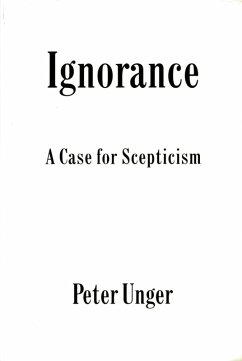
Ignorance and Moral Obligation (eBook, PDF)

PAYBACK Punkte
13 °P sammeln!
Ignorance and Moral Obligation concerns whether and how our ignorance about ourselves and our circumstances affects what our moral obligations and moral rights are. Michael J. Zimmerman begins by distinguishing three well-established views about the nature of moral obligation: the Objective, Subjective, and Prospective Views. Some philosophers have attempted to reconcile the three views in question, but these attempts are shown to fail. The question thus arises: which of the three views ought to be accepted and which rejected? Zimmerman argues that, in light of the ignorance that besets us, th...
Ignorance and Moral Obligation concerns whether and how our ignorance about ourselves and our circumstances affects what our moral obligations and moral rights are. Michael J. Zimmerman begins by distinguishing three well-established views about the nature of moral obligation: the Objective, Subjective, and Prospective Views. Some philosophers have attempted to reconcile the three views in question, but these attempts are shown to fail. The question thus arises: which of the three views ought to be accepted and which rejected? Zimmerman argues that, in light of the ignorance that besets us, the Objective and Subjective Views should be rejected and the Prospective View accepted. The argument is based on close consideration of a kind of case provided by Frank Jackson, one in which an agent has deficient evidence regarding the outcomes of his options. Many objections to this argument are entertained and rebutted, by means of which the Prospective View is itself elaborated and defended. Among those who accept the Prospective View, the primary motivation for doing so has often been that of finding a useful guide to action, but Zimmerman argues that the Prospective View can be only of strictly limited help in providing such a guide. Finally, he addresses some implications that the Prospective View has regarding the nature of moral rights. Our possession of moral rights is precarious, being dependent on the evidence possessed by others. Once again, several objections are entertained and rebutted. The distinction between rights and desert is stressed, and the relevance of risk to rights is explored.
Dieser Download kann aus rechtlichen Gründen nur mit Rechnungsadresse in A, B, BG, CY, CZ, D, DK, EW, E, FIN, F, GR, HR, H, IRL, I, LT, L, LR, M, NL, PL, P, R, S, SLO, SK ausgeliefert werden.













